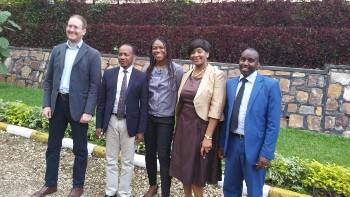Role of Judicial Partnership in Supporting the Functioning of the Nigerian Courts during the COVID-19 Pandemic

The COVID-19 pandemic has posed a number of challenges to Nigerian courts. With the support of A4ID’s ROLE UK Programme, the Nigerian State Ministries of Justice and the Judiciary of England and Wales have worked together to not only overcome these challenges but to improve the courts’ functioning under adverse conditions.
Since March 2019, A4ID’s ROLE UK Programme has been supporting a partnership between the Judicial College of England and Wales and several Nigerian State Ministries of Justice, with assistance from Africa House London. The partnership aims to improve consistency in the training of magistrates in multiple Nigerian States with an emphasis on ethics and independence issues, equal treatment, case management, reasoned rulings, and handling vulnerable witnesses.
The Nigerian Vice-President had requested assistance through a UK MP. He identified a lack of training available for magistrates across multiple Nigerian states. Magistrates sit in Tier Four courts – State Courts – and preside over 90% of all Tier Four court cases. Therefore, offering them consistent and comprehensive training is paramount to upholding the rule of law within the country.
The ongoing collaboration between the Judicial College of England and Wales and the Nigerian State Ministries of Justice will ultimately contribute towards achieving UN Sustainable Development Goal 16 on peace, justice and strong institutions in Nigeria.
Face-to-Face Training in Nigeria before COVID-19
Judge Rachel Karp, Judge Barbara Barnes, and Judge Tim Devas initially delivered an in-person training in Niger State in August 2019. This training took place over the course of five days in partnership with the Niger State Ministry of Justice. It consisted of two 2-day courses, held back-to-back and followed by an additional day of training: ‘Introduction to Train the Trainers’. Seventy-seven of the eighty-two magistrates in Niger State participated in the programme. The ‘Introduction to Train the Trainers’ element was built in to ensure ongoing professional development of the Nigerian Judiciary and to decrease the need for external assistance from the UK over the course of the partnership.
Both partners hoped that this training in Niger State would be a pilot project, used to establish a feasible and sustainable programme that could be rolled out to neighbouring States across Nigeria. The Judicial College International Committee supported this initiative to explore the effectiveness and sustainability of training the lower-level judiciary in developing countries. Usually, senior judiciary receive training with the hope that this knowledge and expertise will cascade down to the lower levels of the judiciary. Here, the partnership took a different approach. As the junior-level judiciary preside over 90% of the cases in Nigeria, training magistrates has the potential to be high impact. This bottom-up approach can improve the delivery of justice to people who experience the justice system at the grassroots level.
Challenges and opportunities posed by the COVID-19 Pandemic
Following the success of the programme in Niger State, the partnership had planned to deliver in-person training in the neighbouring states of Sokoto State and Federal Capital Territory (FCT) State, and Niger State again, from August 2020. However, this training was cancelled due to the COVID-19 pandemic. Judge Rachel Karp, at the time the International Training Coordinator for the Judicial College of England and Wales, developed an online webinar series in order to ensure a continued learning relationship with the Nigerian Judiciary.
A series of six experience-sharing webinars entitled ‘Keeping the Courts Functioning During the Covid Pandemic’ took place online via Zoom between July 2020 and January 2021. The purpose of these webinars was for judges from the Judiciary of England and Wales and magistrates from Nigeria to share their experiences, discuss the impact that the COVID-19 pandemic was having on their respective court systems and to identify effective ways to manage a backlog of cases. Five Nigerian States participated in the series: FCT, Niger, Sokoto, Niger, Imo, and Kaduna. From the UK, Judge Jonathan Klein and Judge Tan Ikram delivered these webinars alongside Judge Karp. A further three judges, Judge Martin Picton, Judge James Burbidge QC and Judge Sarah-Jane Griffiths, also joined the final webinar of the series.
The partners conducted an evaluation at the end of each webinar to identify areas for improvement and refine the agenda for subsequent trainings. To increase interactivity within the sessions, the partners made a number of changes to both the format and content, for example, integrating breakout rooms to allow participants to discuss case studies with their peers and one of the UK pro bono judges.
Following the success of this webinar series, the partners decided to continue the momentum of their work by developing an additional series of online training modules. These are currently being rolled out in FCT, Imo, Kaduna and Sokoto States. The series includes modules on ‘Case Management’, ‘Sentencing’, and ‘Evidence’.
There are currently 20 judges and 510 magistrates participating in the training. The first phase ran from January to March 2021, the second phase ran from June to September 2021, and the third from December 2021 to January 2022. As with the experience-sharing webinars, the partners have set up a mechanism for evaluating and improving the modules as the series progresses.
The Impact of the Experience-sharing Webinars and Judicial Training Modules
The ‘Keeping the Courts Functioning During Covid’ webinar series provided a space for a two-way exchange of ideas during an unprecedented crisis. This enabled judges from both jurisdictions to support one another in navigating this challenging and uncertain time, which placed many restrictions upon their work.
Moreover, the webinar series was instrumental in supporting the Nigerian Judiciary to continue to uphold the rule of law during these difficult circumstances. During debrief calls with the ROLE UK Programme team, partners in Nigeria reported that hearing from the UK judges about their experiences of carrying out their judicial duties during the pandemic gave the magistrates renewed confidence to carry out their own judicial duties.
Prior to the webinar in Kaduna State, the majority of courts were not functioning, in accordance with government instructions and judicial policy. Influenced by the discussions during the webinar, all courts in Kaduna were directed to resume sitting soon after the webinar took place. Similarly, in Sokoto State, the webinar promoted the (remote) reopening of courts, which allowed for a faster recovery from the disruption that the COVID-19 pandemic had caused. The webinar also served as a forum to draft rules for remote hearings for non-contentious matters and to review social distancing guidelines for in-person cases. As a direct result of the webinar, the date for courts to resume legal proceedings was brought forward.
The online format has allowed the partnership to benefit a wider geographically dispersed group of magistrates and High Court judges. Relationships that might otherwise not have been possible have been formed and developed against the backdrop of the COVID-19 pandemic. Feedback from these webinars has been very positive. The Chief Registrar of the Kaduna State High Court stated in the feedback form for the Keeping the Courts Functioning webinar that ‘The program was so useful, resourceful and educative’. The Attorney General of Sokoto State fed back in a debrief call that Justice Mohammed Mohammed of the Sokoto State High Court had said that the Keeping the Courts Functioning webinar was ‘well-articulated and well-delivered’. Furthermore, Helen Grant MP attended two of the Keeping the Courts Functioning webinars and advised that she was ‘extremely impressed’ with the judicial webinars.
Even prior to the outbreak of the COVID-19 pandemic, the Foreign, Commonwealth and Development Office (FCDO) advised against travel to numerous Nigeran states. The rapid increase of remote working as a result of the COVID-19 pandemic helped to facilitate a transition within this partnership from in-person delivery to a virtual format. The development of training in an online format has expedited the rolling out of the judicial training programme to additional States. It is hoped that in future the lessons learnt from the ‘Keeping the Courts Functioning During Covid’ webinar series and the judicial training modules will allow the development of new relationships with Nigerian States and in particular States where security concerns would prevent in-person training.
The Support of the ROLE UK Programme
Currently, the Programme provides essential support by funding the partnership’s online and in-person activities. During the pandemic, the Programme provided technical facilitation as well as logistical assistance for holding online trainings. The participants found it difficult to access these online trainings individually due to technical issues. In response, the Programme was able to advise and provide funding for a space where Nigerian judges and magistrates could come together in-person to view the online trainings being delivered from the UK. This adaptation received great feedback from both UK experts and the Nigerian judges and magistrates. The Judicial Office of England and Wales expressed that the trainings were now streamlined and engaging. The magistrates and judges also shared that this setting for the training gave the group a valuable opportunity to exchange peer-to-peer experiences and discuss best practice.
The Programme has also been a tool for the partnership to assess the risk of these hybrid activities and has provided solutions for mitigating such risks. Due to the worsening security situation in the local areas, the Programme also supported safe transport for the participants to and from these training venues.
This partnership has facilitated the Nigerian courts to remain functional during the COVID-19 pandemic, fostered new working relationships and strengthened the existing relationship between the Judiciary of England and Wales and the Nigerian State Ministries of Justice. Through this support, the Programme has been able to contribute towards allowing the UK government to promote effective, transparent and robust justice institutions and political processes, while strengthening the rule of law in partner jurisdictions.
The success of the training has led to requests for engagement and support with developing training from Nigeria’s Federal Judicial Training Institution. This has the potential to benefit even more States and be sustainable by encouraging and supporting modern judicial training methodology across the whole country.
The partners believe that the achievements of this partnership have laid the foundation of further capacity building work which will continue to be impactful in the long-term, while hopefully reaching more beneficiaries.

Above: A map of Nigerian States participating in the partnership activities

